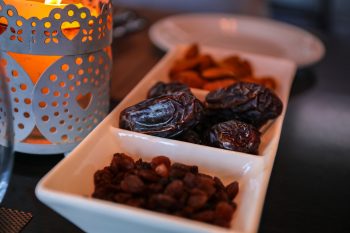Locked down together during Ramadan Posted by Hanan Ben Nafa on May 1, 2020 in Arabic Language, Culture, Vocabulary
From the beginning of Ramadan, I’ve been following a comic show on YouTube called كملت معي Kimle-t ma-ʕi and I would like to share with you its theme song or الشارة iš-šaarah as it’s called in Syrian Arabic (the variety used in the show). The show’s theme song can give you the gist of what the show is about! To help you with this, I will provide the English translation of the lyrics of the song.
The plot of the show:
قصة المسلسل
The show is produced by a Syrian guy شاب سوري called Amroعمرو (here’s his Channel) who lives in France and has been uploading funny videos from the comfort of his house for years now, utilising مستخدمًا his acting talent موهبته في التمثيل to criticise لانتقاد his society مجتمعه in a funny style بأسلوب مضحك.
The show كملت معي is about the main female character أم سوزان Um Suzaane who has to take care of her family (Abu Suzanne أبو سوزان , Suzaane سوزان and Malaak ملاك ) and feed them during Ramadan. For Um Suzaane, what’s terrible about this Ramadan is that her father as well as three members of her husband’s family (whom she doesn’t get along with at all لا تنسجم معهم أبدًا) came to visit her while the ambulance came to take some neighbours to the hospital as it turned out they have Covid-19. The family were told they need to self-isolate together and not to leave the house! This means that she will need to cook for seven people, which is a nightmare for her.
The song is an expression of her frustration إحباطها with the situation تجاه الموقف she finds herself in الذي وجدت نفسها فيه . The show is about the way Um Suzaan decides to deal effectively with every one of them in order to eliminate problems تقليل المشاكل between them.
*The translation is not literal but it’s there so you can understand the conveyed meaning.
Let’s listen 🙂
Lyrics + translation:
كلمات الأغنية + الترجمة
كملت معي عالآخر
The Worst has happened
رح طق من القهر
I’m fed up with this situation
إجى الشهر الفضيل
The holy month has arrived
مزروبه بالحجر
I’m stuck in the quarantine
* * * * * * *
لا لا لا مو بس هيك
No, no, no, it’s not just this
الجايي أعظم بكتير
What’s coming is much greater (worse)
انحجرت بنفس البيت
I got locked down in the same house
مع ناس بحبون كتير
With people I really love
* * * * * * *
جبروني شهر بالحجر
I was forced to quarantine for a month
الله يمضّي هالأيام
I hope Allah will make these days pass
مع حماتي وبنتا وبنتا
With my mother in law and her daughter and her daughter
كان أهون لي الإعدام
A death sentence would have been easier than this
* * * * * * *
والله تَيمشي البيت
I swear, the house will be in order
إيه بس علقوا مع مين
Yeah, but they’ve met their match
لا تلوموني انجنّيت
Don’t blame me, I just got mad
حدا يسفّرني عالصين
(please) someone take me to China
* * * * * * *
كملت معي عالآخر
The Worst has happened
رح طق من القهر
I’m fed up with this situation
إجى الشهر الفضيل
The holy month has arrived
مزروبه بالحجر
I’m stuck in the quarantine
* * * * * * *
*Note:
بنتا وبنتا
This is the Syrian pronunciation of what would be – بنتها وبنتها in Standard Arabic, which means “her daughter and her daughter”. Usually, the 3rd person, feminine possessive pronouns1as well as masculine possessive pronouns (singular/plural) “هـ” is silent in Syrian Arabic.
Explanations of some expressions:
شرح لبعض التعبيرات
كملت معي عالآخر
Literal meaning: it totally ended with me.
Actual meaning: the worst has happened.
*A ready expression used when someone can no longer bear a situation.
راح طق من القهر
Literal meaning: I’m going to blow up because of oppression.
Actual meaning: I’m so sick/tired of this.
*A ready expression used when someone is very fed up or frustrated.
انحجرت
Meaning: I was quarantined.
This verb “inhajar-t” is in the passive voice and it’s related to the noun “hajer” حِجِر, i.e. quarantine.
أهون لي
Meaning: Easier for me.
The comparative adjective “ahwan” is from the adjective “hayyin” هيّن, i.e. easy.
بس علقوا مع مين
Literal meaning: But who they got tangled with. The verb “ʕil-2u”, i.e. got tangled with.
Actual meaning: But they’ve met their match. It also means something like: “They can’t mess with me”.
*A ready expression used when someone intends to handle difficult people or rivals.
- 1as well as masculine possessive pronouns (singular/plural)

Build vocabulary, practice pronunciation, and more with Transparent Language Online. Available anytime, anywhere, on any device.




